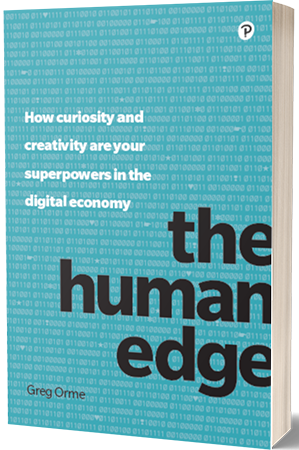Picking up this book, the reviews alone set up a sense of foreboding. Words like ‘survive’ ‘terrifying’ and ‘keeping your job’ jump out at you. As a child of the 70s, I grew up with Maggie Philbin and Howard Stableford showing me the ‘future’ – hoover attachments to cut you hair, wearable goldfish bowls for hay fever sufferers and robot snooker players. So, I was on the wrong side of sceptical when I picked up this book.
From the very start, the author sets out a strong claim – that the book will be the key to unlocking a number of fundamental areas around the need to be ‘a more human, human’ and the four Cs that are outlined as the critical factors for success. No pressure then! But the question is, does it deliver? Well, kind of.
What follows is a book of two halves. The first is a stats-packed narrative of the growth and maturity of AI. How it’s become pervasive in our lives to a level that few of us would ever realise. It’s a gripping read, and I could feel the breath of AI blowing down my neck as I read the statement that technology is, for the first time, coming for (us) the white-collar workers. Orme has a flair for storytelling and feeds the reader with some great analogies to bring concepts and dry topics to life. One moment we are in a car driving onto a motorway, the next, sitting in a carriage with Mozart in a rainy Salzburg.
It’s in equal parts funny, scary, reassuring and shocking. In some ways it feels like we are reading the back-story of a super-villain, where we all laugh at its early mistakes (the Hitler-loving racist chatbot for example). And, in time honoured tradition, the humiliated nemesis shouts ‘I’ll make you all pay’. And it is doing just that. The spread of AI is beyond cognition and its specific applications are damn close to removing a large number of jobs.
But then part one ends, and stuff gets serious. It took me a good few pages to get over the fact that the first part was so short. I was left hungry for more tales of AI horror/error/enablement. But all that is behind us, and the book changes gear as it moves into a more developmental phase. It continues to mix it up nicely with mentions of Frankel, Edward de Bono and Waldo Emerson, plus a support cast of 100s. It’s my kind of book, playful, packed with short bursts of insight and examples, built around a structure that makes sense. He uses rich language and phrases that catch your eye and mind.
Part two walks through the 4Cs in detail, with lots of evidence, anecdotes and practical tools to help you build more skill in the areas of Consciousness, Curiosity, Creativity and Collaboration. The tips are direct and applicable, and this book is a must for people wanting to make improvements in those areas
Greg Orme uses an effective tool – Dance Steps – to guide readers through the four Cs that formulate the backbone of his response to the AI rise. There’s also a series of fun and thought-provoking Human Experiments that encourage the reader to become more immersed in the content and find out more through self-contemplation. Ultimately, his Herculean effort to fill the book with facts and examples makes the content irrefutable and there’s a level of confidence through the book that’s reassuring.
So, I loved the book, and intend to read it again without the pressure of a reviewer’s critical eye. But, back to my hesitation ins saying the book fully delivers, I do have a couple of niggles.
Firstly, and, hands up, it’s my problem, there just wasn’t enough depth and history around the rise of AI. My guess is there’s a whole book on this subject and I would have liked the book to have more weighting in this area. Maybe not killer robots and self-aware super computers turning us into catatonic, dreaming power sources, but it’s such a rich area, it warrants more space.
Secondly, creativity. Orme’s a firm believer that this can be developed and taught, rather than a trait. As all authors do, his narrative takes the content that supports the theory. But I’m not so sure. My experience is that true creativity is a very tough thing to develop, and often people become adept at a process of innovation, rather than becoming truly creative. I agree creativity is critical, but I am not as convinced it is so easy to learn. The book covers stories of computers already being innovative through taught processes – and doing it damn well.
Small gripes – ultimately, it’s a cracking read from start to finish and a wealth of learning and growth opportunities. Chances are, if you ask Alexa, she’ll read it to you.
Chris Preston is a culture expert and one of the founding partners of The Culture Builders
Published by Pearson







